#i love geese so much its unreal
Text
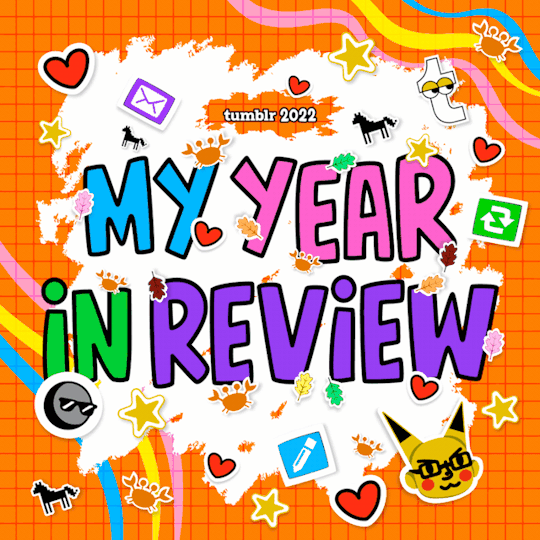
I posted 6,570 times in 2022
98 posts created (1%)
6,472 posts reblogged (99%)
Blogs I reblogged the most:
@tharkflark1
@kr1llz
@kinkshame-the-courier
@wizardpotions
@voulinn
I tagged 293 of my posts in 2022
#fallout new vegas - 65 posts
#arcade gannon - 53 posts
#fnv - 52 posts
#benny gecko - 22 posts
#soupposting - 19 posts
#fallout - 15 posts
#courier six - 14 posts
#homestuck - 13 posts
#unreality - 12 posts
#goncharov - 11 posts
Longest Tag: 122 characters
#ok i can see the argument that the followers of the apocalypse don’t have nearly the education system pre-war america does
My Top Posts in 2022:
#5
Gonna say something similar to what I said about Encanto: Turning Red is a movie about growing up as a teenage girl, particularly as the daughter of a Chinese immigrant, before queer theory ever enters the picture. Do not forget that.
251 notes - Posted March 14, 2022
#4
The thing I love most about the "Humans are Space Orcs" style of writing is that it makes us look at our world from an outsiders perspective. We're so used to mosquitos and magpies and turkey vultures and geese and tornados and poisonous plants and the weird humanisms we do on a daily basis that approaching it from the perspective of someone who has little to know experience being an earthling adds zest to the whole world for a little while
252 notes - Posted November 27, 2022
#3
Boone, to Ceasar's corpse: Thumbs down, you son of a bitch.
Arcade: ...up.
Boone:
Boone: What.
Arcade: If you want to match his Roman aesthetic you would want to say thumbs up.
Arcade: When the ceasar gave a gladiator a thumbs down, it meant the losing gladiator could put his sword down because he was more valuable alive.
Arcade: But a thumbs up is believed to have been a signal to thrust upward into the heart.
Boone:
Boone: Do you seriously think he follows that level of consistency?
Arcade:
384 notes - Posted June 26, 2022
#2
I hate when people interpret Arcade as your average blonde prettyboy with nothing behind the eyes because like.??? This is a 35ish year old man who has spent his entire life running from the government on the principle of who he was born to. He is rough around the edges. He has trauma. He has scars, mental and physical. His history is riddled with tragedy. He conceals his earnest love for humanity with dry wit and literary references because expressing too much love has brought him pain. If you draw Arcade and it doesn't feel like he's a man glued together by idealism and the hope humanity may finally learn from its msitakes then what is the fucking point
726 notes - Posted September 18, 2022
My #1 post of 2022
"Cryptocurrency is dying, repost this to make it die faster" No. No, I want cryptocurrency to die slowly, by attrition. I want it to stop being popular among rich people to have NFTs that harm the earth and start being popular to grow your own garden, I want crypto bros to scramble to find a real job or go back to school, I want the glaring blue light of their overloaded computer's screen to bore into their skulls as they watch that number get closer and closer and closer to zero. Cryptocurrency is a rabid animal, and as it grows out of the aggression stage, the seizures will get worse and more painful. I want everyone to refuse shooting this animal. I want cryptocurrency see the Earth staring coldly at its failing body and know that there is no mercy in this world or the next.
2,209 notes - Posted June 14, 2022
Get your Tumblr 2022 Year in Review →
3 notes
·
View notes
Note
I have recently started observing pigeons and I find them fascinating and beautiful!! Do you like pigeons?? Also geese are pretty cool :)
pigeons!! i love pigeons!! and doves!! theres pigeons in town that ive gotten to land on my hand, arms + lap before!! i think at 1 point i had about 6 pigeons on me, it was v fun. my fave pigeon breed is the lahore pigeon, theyre so pretty!! but feral pigeons are beautiful too. in terms of wild species, idk if doves count, but im a big fan of luzon bleeding heart doves :D
and GEESE!! i love love love geese!! in the winter we get flocks of barnacle and brent geese that migrate here! in other parts of the country theres greylag + greenland white fronted geese! we also get a few more unusual geese, such as pink footed, bean + cackling geese! my fave goose species are barnacle geese, kelp geese + red breasted geese!
also heres a fun goose experience i had: i live in a housing estate + 1 morning i looked out the window to see. a canada goose taking a stroll down the street. now as you can imagine this was. Very Unusual. my dad + myself went out and a few neighbours were like “wtf is a goose doing here”. fortunately theres a nearby raptor center who takes in wild animals who need help. so we caught the goose in a blanket and i went through a 10 minute car journey on a bumpy road holding a canada goose wrapped in a blanket. we got mr goose to the center and, since theres a small number of feral canada geese on a nearby lake, the guy who runs the center said hed release it there. well after a few weeks it showed up again but since it seemed healthy + scared all the local dogs from bothering it we just left it to its own devices. it hung around for a few hours before leaving. hope its doing ok out there in the world
lots of ppl say geese are evil and it makes me sad :( theyre just defensive. and this goose was very agreeable considering the situation
#saturn replies#also handfed red breasted geese at a waterfowl center :D#i love geese so much its unreal#Anonymous
1 note
·
View note
Text
Sanctuary Pack Stories: The Herbalist [Part Three]
[Eight and Dace continue on their journey to track down an expert herbalist in an effort help cure the illness ravaging The Sanctuary Pack]

It’s good to be on the move again; a blue, brilliant winter morning, the air crisp and clear as glacial runoff. A few stubborn birds perch in the barren trees, trying their songs against the silence.
Dace clears her throat. "Eight. I wanted to say."
"Hm?" Eight looks up, half-startled. She's been deep in thought all morning; 'hunting clouds', as Saturn would say.
And no wonder. There had been a moment, the night before, when Dace had made a mistake. Had made Eight uncomfortable-- had made things uncomfortable, between them.
Eight’s eyes meeting hers; her breath fogging in the winter air, and Dace had thought, I’ve missed this more than I can say. Something must have showed in her face; Eight had stepped away, fast, turning her head.
She has been quiet, since.
"Just: last night. If I made you uncomfortable, or something." Dace shrugs, keeps her eyes fixed forward. "You know-- sorry. Won’t happen again."
"Oh!" Eight shakes her head. "Oh no, Dace, that's-- No, I wasn't. Uncomfortable, I mean! It's fine."
Dace does twist, now, to look over Eight. She's not looking back; has her head craned around, staring with great intensity into the trees.
"Alright," Dace says. Resolves to keep a little more distance, anyway, if Eight’s going to be too polite to admit when she’s wrong-footed.
The walk on, the loudest sound for miles the crunching of their paws through the crusty snow. The sun creeps its slow way across the sky.
Eight clears her throat, venture: “Um, so-- how is it?”
Dace looks up.
“Being a-- scout. Or a loner? I mean--” she shrugs, looks briefly at Dace and then away again. “I don’t know. Is it-- fun? I guess? Do you like it?”
Dace nods. “It’s alright. It’s good, actually.” She looks out at the frozen wood: at the towering trees, bark black against the snow, the sharp pine-needle smell. At the sky, a piercing, thorn-sharp blue above. “I do like it. In fact…”
In fact, they're right by that old pond, aren't they? The frogs will be dug into the mud hibernating-- they could dig some out, like that crow had shown Dace last spring, and--
She looks sideways at Eight. Remembers her odd stiffness the night before. Clears her throat. “In fact, though, it can get a little boring.”
“Oh?” Eight cocks her head.
“Sometimes.” Dace shrugs. “And you? Healing? That seems-- interesting.”
A stiff pause. Eight huffs. “Well, I guess-- a little too interesting, lately. Um.”
Dace winces. “Of course. Scat, Eight, I’m sorry-”
“No--” Eight shakes herself. “No, it’s okay. It is- not just now, I mean- interesting.” She laughs, a little awkwardly.
They walk along for a while. Dace watches her paws; studies the prints she makes, tries not to think about much else.
After a while, Eight laughs again. “I’m sorry, Dace-- I don’t really know-- there aren't. Sorta, fun anecdotes, I guess? It isn’t--”
“No, you’re fine!” Dace huffs. “Just uh, not used to travelling with someone else. Probably getting too chatty.”
“No.” Eight sighs. “If it was spring- or summer or even fall, really- I could show you plants and stuff? Like herbs? But.” She looks out over the forest; undergrowth buried under months of snow, the trees dormant, roots all locked away beneath the frost.
“Sure,” Dace says, easily. “Bad season for it. Maybe--” I can come by in spring, and you can show me then. She almost says it. Clears her throat. “Maybe this would have been a little more fun in spring,” she settles on instead, trying to keep her voice light.
“Less cold,” Eight says, by way of agreement.
They walk on-- endlessly, they walk on.

It’s five more days of travel to reach the bear, and even Dace is starting to get a little footsore. The hard, icy surface of the snow is wearing away at her pawpads, sure as rough stone would.
Eight isn’t any better, facing all the same strain of long travel with none of the practice Dace has. She limps up to where Dace has paused on the edge of the forest, and comes to a stop, breath fogging as she catches her breath.
They’ve come to the edge of the forest.
Beyond, the prairie goes on forever. White, flat land, rolling endlessly on until the blue curve of the horizon. It seems very exposed. Dace imagines living there, without shelter of tree or rock, without shadow or undergrowth, and shivers, despite her thick winter coat.
Eight makes a low, uncertain sound in the back of her throat. She’s hunched up into herself; ears flat, tail tucking under, and Dace’s chest squeezes.
“Pretty weird,” she says, to break the silence.
And she hasn’t been saying as much, lately. Been trying to give Eight her space. But it’s worth it, now, to see Eight relax, a little. To see her stand up straighter.
“Pretty weird,” she agrees.
And still the prairie stretches on. Beyond the shelter of the trees, a wind kicks up, and a tumbleweed of snow goes skating out across the plain, silver against the brilliant, endless blue of the sky.
“Hoot,” Dace says, and finds her voice comes out a bit hushed. She clears her throat. Tries again. “Hoot used to talk about-- where she came from.”
“Mhm.” Eight can’t seem to find the words to respond; that’s okay.
Dace goes on. “On hunting trips- back when I was hunting- She's say about the ocean. You know?”
“Yes,” Eight says, low.
“About how there was somewhere the land stops. And it’s just water forever, after that. Until the-- the edge. Do you think...”
She doesn’t know how to put it. But Eight nods, eyes still fixed rigidly forward. “Yes,” she says, again. “This is-- it seems like--”
The both look out over the prairie again. Flat land, stretching on. It must end, somewhere. But--
Dace shakes herself. “Well,” she says, sounding just short of upbeat. “Well. Our bear lives out there, somewhere.”
Eight nods. “Yes,” she says. “Right.”
And if she sticks a little closer to Dace’s side, as they step out onto the plains-- Well. Dace can’t blame her, for it.
It makes her feel better, too.

They reach the bear that evening. A low hill, a copse of cottonwoods, the ceaseless, piercing howling of the wind, unbroken across the whole of the prairie.
“Strange place for a bear to den,” Eight says, her voice very low. “Isn’t it? I mean--”
“Yes,” Dace says. Finds herself speaking very softly, involuntarily. She tries again, clearing her throat. “But from what I’ve heard, he’s a strange bear. He couldn’t help us if he wasn’t.”
Her voice comes out a little more strongly, and Eight straightens up. Nods.
The cottonwoods grow close together, trunks dark and strangely straight, an unnatural quality to them. The wind breaks as they come through the trees, and leaves an eerie silence- not much better- in its absence.
Dace’s own breath is loud in her ears. Something brushes her shoulder-- Eight, drawing close. They look at one another for just an instant. Dace lets out a breath, slowly. Is suddenly very glad to have Eight here with her, in this strange place.
The ground is rucked up by the roots of one enormous tree, in the very center of the grove; its bark is nearly black against the snow, the sharp white-blue of the sky. A dark space peeks out between the gnarled roots.
They have come to the bear’s den, at last.
Dace thinks, for a wild, stupid moment, of the stories Rover tells to pups; a great Rowan tree, a pack of monstrous wolves.
She stares up at the giant cottonwood. Shakes herself. “Hello?” Her voice, thankfully, does not waver. “We’ve come from far away, seeking medicine.” She pauses. Looks sideways at Eight.
Eight looks back at her, ears pulled down in uncertainty. “I’m a healer myself,” she tries, and Dace touches her shoulder, briefly, encouraging. “But I can’t heal this sickness-- we need your help.”
Another pause. The den is all shadow, before them; a deep pit, an open mouth, plunging down into the frozen earth. Dace can’t quite make herself step towards it; shivers at the idea of it, squeezing herself blind and helpless between the roots, towards who knows what.
She tries again, instead. I will go, she tells herself, sternly, if he does not answer this time, I will go in. “Great-- bear healer. May we speak with you?”
Nothing, for a long moment. Dace takes a breath-- wrenches herself away from Eight’s warm side and pads forward to the mouth of the den. Here goes, she thinks, and then--
“Dace!” Eight says, tight with alarm, and at the same time another, deeper voice sounds out.
“Well,” it says. “There’s no need to shout.”
Dace turns, slowly, and there is the bear.
A massive shape, almost unreal. His huge, blunt head dips down beside Eight, nearly the size of her entire torso. His shoulders, humped with muscle, could put pause to a bison. He crouches, peering at Dace, and when he curls his lip up to sniff, his teeth flash long and white.
Eight is stiff as if she’s frozen solid, only a paw’s length away from the creature. The whites of her eyes show, plainly frightened, and Dace wrenches herself into action.
She folds into a bow, back hunching, tail tucking automatically. They don’t hold with submission much, at Sanctuary, but it is nearly instinctive to do it now.
“Great bear,” she says, eyes fixed firmly on the ground- on the bear’s immense paws, heavy and clawtipped, digging furrows into the snow. “I have heard of your healing from other creatures--”
“Yes, yes,” the bear says, his deep voice strangely cheerful. “The geese, was it? They do love to gossip.”
Dace looks up at him, startled, for a moment, and then drops her eyes again, hastily. “It-- was the geese, sir.”
If the bear notices her surprise, he says nothing of it. “Hm. Just as well. Follow me, then!” And he shoulders past Dace- a brush of immense strength, something like one of the human’s cars blowing past on their roads- a near miss, an impression of power- and then he is by, lumbering awkwardly down into his den, and there is nothing left to do except to follow.
#wolvden#The Sanctuary Pack#pack stories#eight#dace#winter three#year three#the herbalist#listen i live in the mountains and i find the prarie very frightening#sorry to like. saskatchewan. but i am a little afraid of you.#anyway! here is this.#sorry this is so fucking long lol.
11 notes
·
View notes
Photo

Toni Morrison | Nobel Lecture December 7, 1993
We die. That may be the meaning of life. But we do language. That may be the measure of our lives.
“Once upon a time there was an old woman. Blind but wise.” Or was it an old man? A guru, perhaps. Or a griot soothing restless children. I have heard this story, or one exactly like it, in the lore of several cultures.
“Once upon a time there was an old woman. Blind. Wise.”
In the version I know the woman is the daughter of slaves, black, American, and lives alone in a small house outside of town. Her reputation for wisdom is without peer and without question. Among her people she is both the law and its transgression. The honor she is paid and the awe in which she is held reach beyond her neighborhood to places far away; to the city where the intelligence of rural prophets is the source of much amusement.
One day the woman is visited by some young people who seem to be bent on disproving her clairvoyance and showing her up for the fraud they believe she is. Their plan is simple: they enter her house and ask the one question the answer to which rides solely on her difference from them, a difference they regard as a profound disability: her blindness. They stand before her, and one of them says, “Old woman, I hold in my hand a bird. Tell me whether it is living or dead.”
She does not answer, and the question is repeated. “Is the bird I am holding living or dead?”
Still she doesn’t answer. She is blind and cannot see her visitors, let alone what is in their hands. She does not know their color, gender or homeland. She only knows their motive.
The old woman’s silence is so long, the young people have trouble holding their laughter.
Finally she speaks and her voice is soft but stern. “I don’t know”, she says. “I don’t know whether the bird you are holding is dead or alive, but what I do know is that it is in your hands. It is in your hands.”
Her answer can be taken to mean: if it is dead, you have either found it that way or you have killed it. If it is alive, you can still kill it. Whether it is to stay alive, it is your decision. Whatever the case, it is your responsibility.
For parading their power and her helplessness, the young visitors are reprimanded, told they are responsible not only for the act of mockery but also for the small bundle of life sacrificed to achieve its aims. The blind woman shifts attention away from assertions of power to the instrument through which that power is exercised.
Speculation on what (other than its own frail body) that bird-in-the-hand might signify has always been attractive to me, but especially so now thinking, as I have been, about the work I do that has brought me to this company. So I choose to read the bird as language and the woman as a practiced writer. She is worried about how the language she dreams in, given to her at birth, is handled, put into service, even withheld from her for certain nefarious purposes. Being a writer she thinks of language partly as a system, partly as a living thing over which one has control, but mostly as agency – as an act with consequences. So the question the children put to her: “Is it living or dead?” is not unreal because she thinks of language as susceptible to death, erasure; certainly imperiled and salvageable only by an effort of the will. She believes that if the bird in the hands of her visitors is dead the custodians are responsible for the corpse. For her a dead language is not only one no longer spoken or written, it is unyielding language content to admire its own paralysis. Like statist language, censored and censoring. Ruthless in its policing duties, it has no desire or purpose other than maintaining the free range of its own narcotic narcissism, its own exclusivity and dominance. However moribund, it is not without effect for it actively thwarts the intellect, stalls conscience, suppresses human potential. Unreceptive to interrogation, it cannot form or tolerate new ideas, shape other thoughts, tell another story, fill baffling silences. Official language smitheryed to sanction ignorance and preserve privilege is a suit of armor polished to shocking glitter, a husk from which the knight departed long ago. Yet there it is: dumb, predatory, sentimental. Exciting reverence in schoolchildren, providing shelter for despots, summoning false memories of stability, harmony among the public.
She is convinced that when language dies, out of carelessness, disuse, indifference and absence of esteem, or killed by fiat, not only she herself, but all users and makers are accountable for its demise. In her country children have bitten their tongues off and use bullets instead to iterate the voice of speechlessness, of disabled and disabling language, of language adults have abandoned altogether as a device for grappling with meaning, providing guidance, or expressing love. But she knows tongue-suicide is not only the choice of children. It is common among the infantile heads of state and power merchants whose evacuated language leaves them with no access to what is left of their human instincts for they speak only to those who obey, or in order to force obedience.
The systematic looting of language can be recognized by the tendency of its users to forgo its nuanced, complex, mid-wifery properties for menace and subjugation. Oppressive language does more than represent violence; it is violence; does more than represent the limits of knowledge; it limits knowledge. Whether it is obscuring state language or the faux-language of mindless media; whether it is the proud but calcified language of the academy or the commodity driven language of science; whether it is the malign language of law-without-ethics, or language designed for the estrangement of minorities, hiding its racist plunder in its literary cheek – it must be rejected, altered and exposed. It is the language that drinks blood, laps vulnerabilities, tucks its fascist boots under crinolines of respectability and patriotism as it moves relentlessly toward the bottom line and the bottomed-out mind. Sexist language, racist language, theistic language – all are typical of the policing languages of mastery, and cannot, do not permit new knowledge or encourage the mutual exchange of ideas.
The old woman is keenly aware that no intellectual mercenary, nor insatiable dictator, no paid-for politician or demagogue; no counterfeit journalist would be persuaded by her thoughts. There is and will be rousing language to keep citizens armed and arming; slaughtered and slaughtering in the malls, courthouses, post offices, playgrounds, bedrooms and boulevards; stirring, memorializing language to mask the pity and waste of needless death. There will be more diplomatic language to countenance rape, torture, assassination. There is and will be more seductive, mutant language designed to throttle women, to pack their throats like paté-producing geese with their own unsayable, transgressive words; there will be more of the language of surveillance disguised as research; of politics and history calculated to render the suffering of millions mute; language glamorized to thrill the dissatisfied and bereft into assaulting their neighbors; arrogant pseudo-empirical language crafted to lock creative people into cages of inferiority and hopelessness.
Underneath the eloquence, the glamor, the scholarly associations, however stirring or seductive, the heart of such language is languishing, or perhaps not beating at all – if the bird is already dead.
She has thought about what could have been the intellectual history of any discipline if it had not insisted upon, or been forced into, the waste of time and life that rationalizations for and representations of dominance required – lethal discourses of exclusion blocking access to cognition for both the excluder and the excluded.
The conventional wisdom of the Tower of Babel story is that the collapse was a misfortune. That it was the distraction, or the weight of many languages that precipitated the tower’s failed architecture. That one monolithic language would have expedited the building and heaven would have been reached. Whose heaven, she wonders? And what kind? Perhaps the achievement of Paradise was premature, a little hasty if no one could take the time to understand other languages, other views, other narratives period. Had they, the heaven they imagined might have been found at their feet. Complicated, demanding, yes, but a view of heaven as life; not heaven as post-life.
She would not want to leave her young visitors with the impression that language should be forced to stay alive merely to be. The vitality of language lies in its ability to limn the actual, imagined and possible lives of its speakers, readers, writers. Although its poise is sometimes in displacing experience it is not a substitute for it. It arcs toward the place where meaning may lie. When a President of the United States thought about the graveyard his country had become, and said, “The world will little note nor long remember what we say here. But it will never forget what they did here,” his simple words are exhilarating in their life-sustaining properties because they refused to encapsulate the reality of 600, 000 dead men in a cataclysmic race war. Refusing to monumentalize, disdaining the “final word”, the precise “summing up”, acknowledging their “poor power to add or detract”, his words signal deference to the uncapturability of the life it mourns. It is the deference that moves her, that recognition that language can never live up to life once and for all. Nor should it. Language can never “pin down” slavery, genocide, war. Nor should it yearn for the arrogance to be able to do so. Its force, its felicity is in its reach toward the ineffable.
Be it grand or slender, burrowing, blasting, or refusing to sanctify; whether it laughs out loud or is a cry without an alphabet, the choice word, the chosen silence, unmolested language surges toward knowledge, not its destruction. But who does not know of literature banned because it is interrogative; discredited because it is critical; erased because alternate? And how many are outraged by the thought of a self-ravaged tongue?
Word-work is sublime, she thinks, because it is generative; it makes meaning that secures our difference, our human difference – the way in which we are like no other life.
We die. That may be the meaning of life. But we do language. That may be the measure of our lives.
“Once upon a time, …” visitors ask an old woman a question. Who are they, these children? What did they make of that encounter? What did they hear in those final words: “The bird is in your hands”? A sentence that gestures towards possibility or one that drops a latch? Perhaps what the children heard was “It’s not my problem. I am old, female, black, blind. What wisdom I have now is in knowing I cannot help you. The future of language is yours.”
They stand there. Suppose nothing was in their hands? Suppose the visit was only a ruse, a trick to get to be spoken to, taken seriously as they have not been before? A chance to interrupt, to violate the adult world, its miasma of discourse about them, for them, but never to them? Urgent questions are at stake, including the one they have asked: “Is the bird we hold living or dead?” Perhaps the question meant: “Could someone tell us what is life? What is death?” No trick at all; no silliness. A straightforward question worthy of the attention of a wise one. An old one. And if the old and wise who have lived life and faced death cannot describe either, who can?
But she does not; she keeps her secret; her good opinion of herself; her gnomic pronouncements; her art without commitment. She keeps her distance, enforces it and retreats into the singularity of isolation, in sophisticated, privileged space.
Nothing, no word follows her declaration of transfer. That silence is deep, deeper than the meaning available in the words she has spoken. It shivers, this silence, and the children, annoyed, fill it with language invented on the spot.
“Is there no speech,” they ask her, “no words you can give us that helps us break through your dossier of failures? Through the education you have just given us that is no education at all because we are paying close attention to what you have done as well as to what you have said? To the barrier you have erected between generosity and wisdom?
“We have no bird in our hands, living or dead. We have only you and our important question. Is the nothing in our hands something you could not bear to contemplate, to even guess? Don’t you remember being young when language was magic without meaning? When what you could say, could not mean? When the invisible was what imagination strove to see? When questions and demands for answers burned so brightly you trembled with fury at not knowing?
“Do we have to begin consciousness with a battle heroines and heroes like you have already fought and lost leaving us with nothing in our hands except what you have imagined is there? Your answer is artful, but its artfulness embarrasses us and ought to embarrass you. Your answer is indecent in its self-congratulation. A made-for-television script that makes no sense if there is nothing in our hands.
“Why didn’t you reach out, touch us with your soft fingers, delay the sound bite, the lesson, until you knew who we were? Did you so despise our trick, our modus operandi you could not see that we were baffled about how to get your attention? We are young. Unripe. We have heard all our short lives that we have to be responsible. What could that possibly mean in the catastrophe this world has become; where, as a poet said, “nothing needs to be exposed since it is already barefaced.” Our inheritance is an affront. You want us to have your old, blank eyes and see only cruelty and mediocrity. Do you think we are stupid enough to perjure ourselves again and again with the fiction of nationhood? How dare you talk to us of duty when we stand waist deep in the toxin of your past?
“You trivialize us and trivialize the bird that is not in our hands. Is there no context for our lives? No song, no literature, no poem full of vitamins, no history connected to experience that you can pass along to help us start strong? You are an adult. The old one, the wise one. Stop thinking about saving your face. Think of our lives and tell us your particularized world. Make up a story. Narrative is radical, creating us at the very moment it is being created. We will not blame you if your reach exceeds your grasp; if love so ignites your words they go down in flames and nothing is left but their scald. Or if, with the reticence of a surgeon’s hands, your words suture only the places where blood might flow. We know you can never do it properly – once and for all. Passion is never enough; neither is skill. But try. For our sake and yours forget your name in the street; tell us what the world has been to you in the dark places and in the light. Don’t tell us what to believe, what to fear. Show us belief s wide skirt and the stitch that unravels fear’s caul. You, old woman, blessed with blindness, can speak the language that tells us what only language can: how to see without pictures. Language alone protects us from the scariness of things with no names. Language alone is meditation.
“Tell us what it is to be a woman so that we may know what it is to be a man. What moves at the margin. What it is to have no home in this place. To be set adrift from the one you knew. What it is to live at the edge of towns that cannot bear your company.
“Tell us about ships turned away from shorelines at Easter, placenta in a field. Tell us about a wagonload of slaves, how they sang so softly their breath was indistinguishable from the falling snow. How they knew from the hunch of the nearest shoulder that the next stop would be their last. How, with hands prayered in their sex, they thought of heat, then sun. Lifting their faces as though it was there for the taking. Turning as though there for the taking. They stop at an inn. The driver and his mate go in with the lamp leaving them humming in the dark. The horse’s void steams into the snow beneath its hooves and its hiss and melt are the envy of the freezing slaves.
“The inn door opens: a girl and a boy step away from its light. They climb into the wagon bed. The boy will have a gun in three years, but now he carries a lamp and a jug of warm cider. They pass it from mouth to mouth. The girl offers bread, pieces of meat and something more: a glance into the eyes of the one she serves. One helping for each man, two for each woman. And a look. They look back. The next stop will be their last. But not this one. This one is warmed.”
It’s quiet again when the children finish speaking, until the woman breaks into the silence.
“Finally”, she says, “I trust you now. I trust you with the bird that is not in your hands because you have truly caught it. Look. How lovely it is, this thing we have done – together.”
https://www.nytimes.com/interactive/2021/books/best-toni-morrison-books.html
#toni morrison#nobel lecture#1993#nobel prize#We die. That may be the meaning of life. But we do language. That may be the measure of our lives.#meaning of life#language
3 notes
·
View notes
Text
The Blue Carbuncle
Now that the subtitles are out and we’re finally on equal ground, time to talk about this piece of fantastic weed shite that I probably shouldn’t be loving so much. The decisions made in this movie still don’t fail to impress me in a high way, it’s honestly such a good addition to the Russian Holmes family.
It’s great, alright
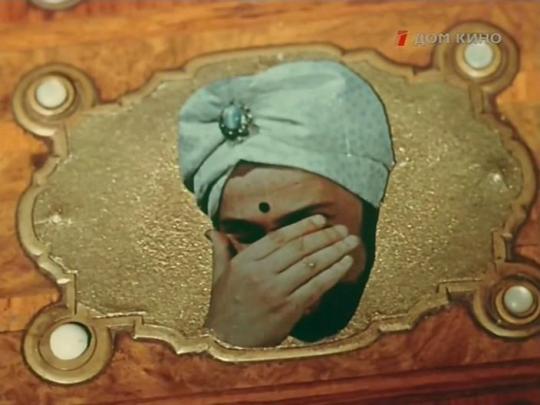
So, just like My Dearly Beloved Detective, this movie is all over England and its humor. “No social issues whatsoever”, “good old England” - jeez man, we get it, you love and laugh at it quite a lot.
I still think this movie wanted to be a some sort of Christmas tradition or something, an almost desperate attempt to become a classic. So many Christmas song and shit - why? It’s made double funny because in Russia, and especially in the USSR, fucking nobody celebrates Christmas, ESPECIALLY in the Catholic tradition. USSR was officially fucking atheist, that’s why they lowkey mock god in this movie so many times (and I think it was pretty funny btw), but even today Russian Christmas is nothing like the English one at all. Amazingly high decision number one: making a Christmas musical to appeal to an atheist and secretly orthodox country. Fantastic.
There’s not much of Holmes and Watson in this movie, surprisingly. It’s divided into two parts: first the entire goose shitshow, then these guys trying to solve it. Well, since the entire story was shown quite plainly already, of course there’s no mystery or whatever whatsoever, the movie exists just to get you high. So yeah, not much of the squad here, which is a shame, in my opinion, because I think these guys were great.
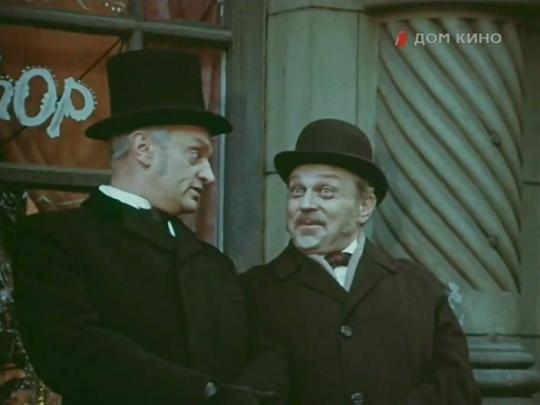
High as balls Watson, Holmes that doesn’t look like Holmes at all and has a crush on Watson’s gf: they’re really great, alright. Kavun even made an effort to easter egg Romanov (Watson) in the new series as judge from the fourth episode.
About adaptation migration, here’s Gregson from the Soviet series
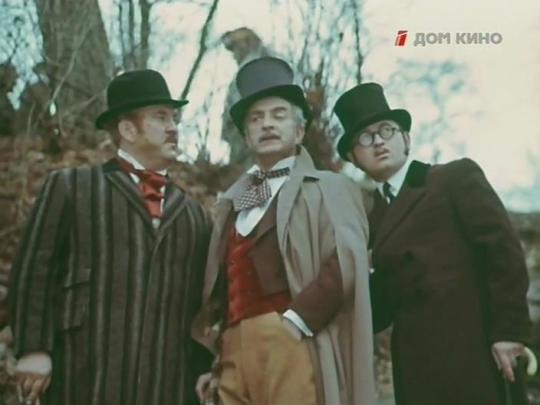
Very fabulous, very close to his bois, very criminal. Gregson sure had a dark past.
What really irks me is the fact that this and the series were released like on the same year. 1979? Yes, both of them. Does that mean he was doing both the best and the highest adaptations simultaneously with no shame like that? Yikes.
Also, Dashkevich’s in this. Yes, the composer, of the Soviet series, of the Detective, now this. Technically, this one was first. The guy scored all three Soviet adaptations like no big deal. I guess it kinda shows, the tune can be catchy sometimes, but the freaking decisions made about the songs strike there again. Most of the time the lyrics don’t match the flow of the song? How the fuck was that even possible, almost every song has at least one slip up where the words clearly don’t fit into the beat, it’s fucking amazing. Listening to half-distorted songs in an already high movie, ding number two for the decisions made in this film.
By the way this guy I swear
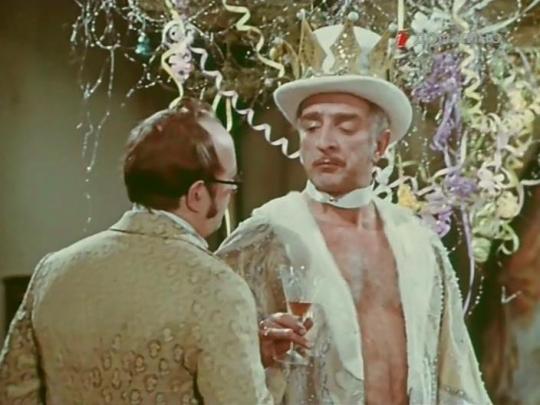
I really do like their dynamic
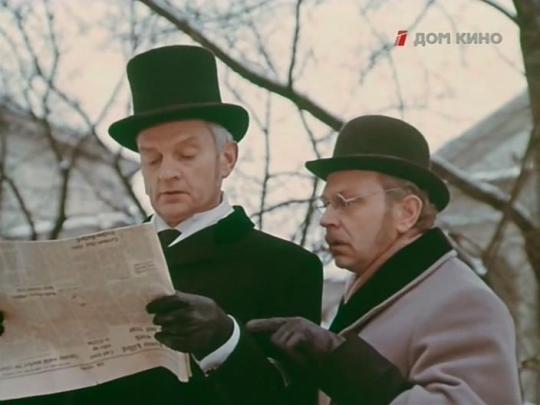
There’s James, of course, the actual story is different from canon, fine to watch on the first try, not very entertaining afterwards. The guy’s hot tho
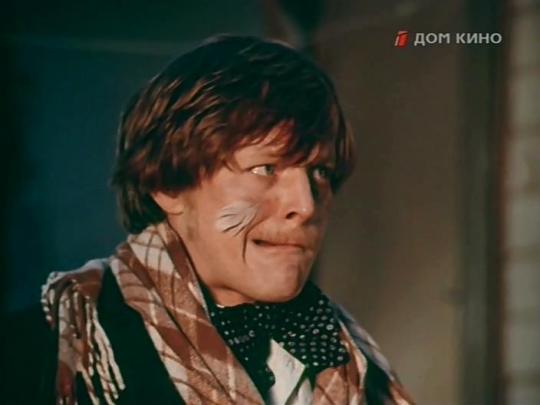
Can sing and do some sick weed dance, that was fun. I am going to be this gal and unnecessarily mention that his fate could’ve been better, lots of wives, no kids, and one stepson who bore his name been long dead by this point. He’s still alive, and well, I guess. Being an actor in the USSR is some shitty business.
When the narrative finally switched to the Gang, we’re treated to more weed and this fantastic fucking song.

I love it, for real. But holy shit, the lyrics don’t match the flow big time here, and oh boy when Holmes opens his mouth. Jesus fucking Christ what an experience, the guy barely can sing at all and he got most of the lines - Watson sings better than him! This is made even more unreal by the fact that the actor was completely voiced over - they’ve hired another guy to talk and sing instead of him, and having this freedom, they could’ve chose someone who could actually do both. And they deliberately chose not to, and Holmes got an upgrade of someone who can’t even survive a song and again, DELIBERATELY butchered the flow of it on top of that. And Watson opens his mouth thrice and it was the actual actor and he’s GREAT.
This fact, combined with the trippy visuals and broken flow feels just absolutely surreal to watch, to me it’s the third and the biggest braintwisting decision this movie made. And that is considering, the actual lyrics most of the time are not bad at all, sometimes pretty interesting and even witty at times, especially in original Russian. How and why?
The Gang listening to pub dudes roasting Watson’s writing abilities and Holmes himself is the best thing.
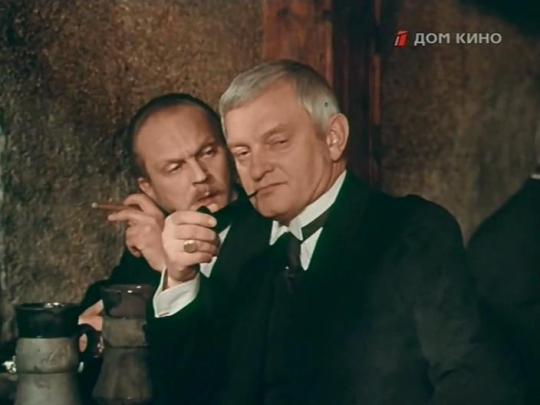
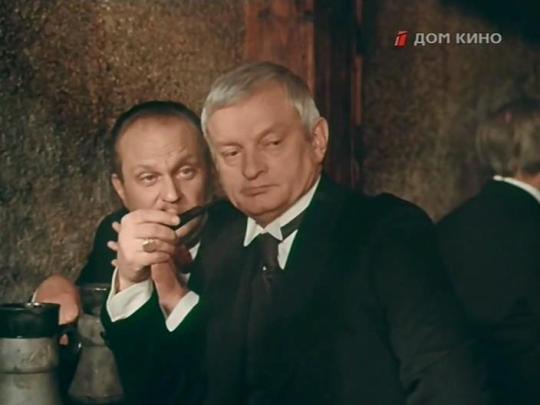
Hamlet is the best detective story, man, some casually intellectual humor right there.
Not but really, maybe I shouldn’t be loving this so much but I do
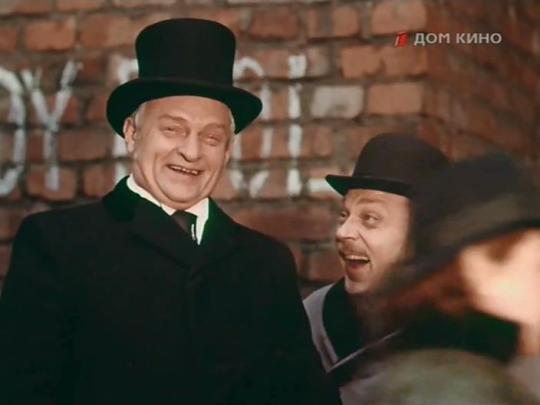
James doing his sick weed moves, drop the beat DJ. Fuck the geese and gold diggers
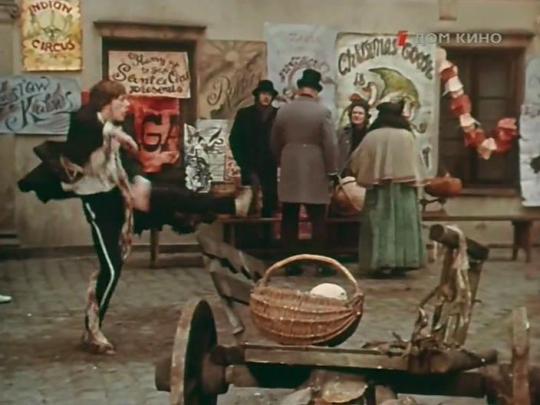
The plot itself is so dumb it’s hilarious. Gregson stealing all of Holmes’ furniture away but leaving the actual carbuncle behind because he doesn’t believe Holmes is such an idiot to leave the gem just lying around in the open, which is exactly what happened.
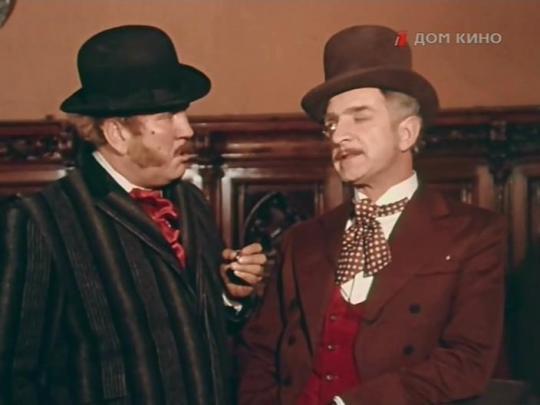
Stupidity is the new sexy.
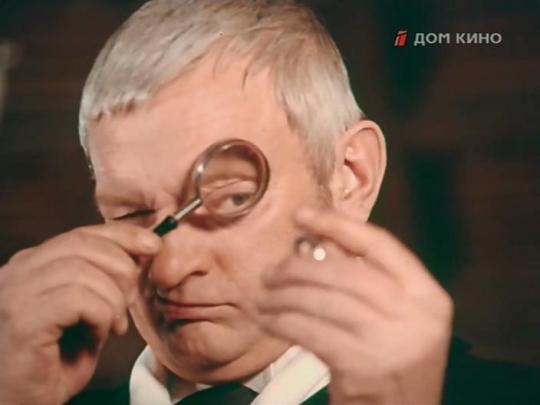
And man, they still managed to make a twist to the story in form of that countess being behind the shit. She’s beautiful, by the way.
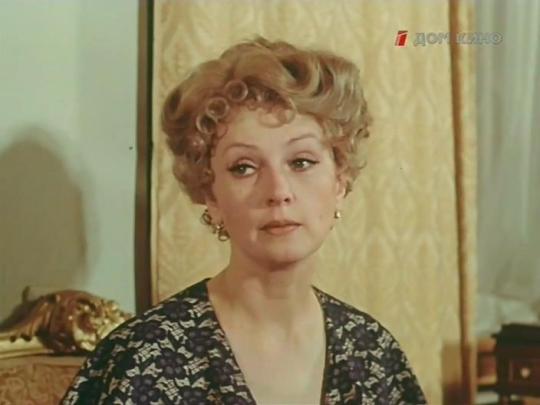
Double trippy when she decided to seduce Holmes and he wasn’t exactly opposed to that.
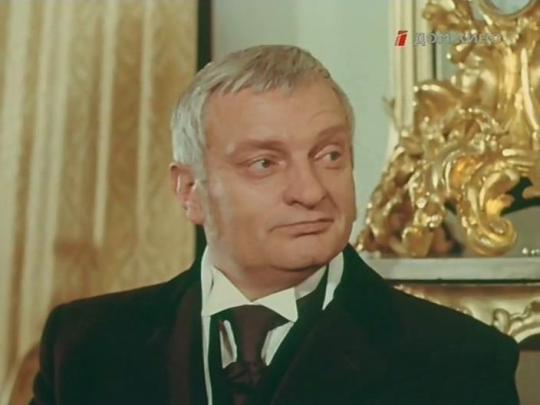
Why do I love this so much.
But oh well, I just do. I am naturally high on acid, you know that, so for me that was a match made in heaven, but even then this movie managed to outhigh me. The trippy ass decisions they make, the ridiculous plot, the evident average quality to everything, the way they just don’t give a fuck about Holmes and what’s normally allowed in this universe. It’s fun to me, honestly, that’s why I love it. That’s why I still hope everyone else would appreciate it, even though I know that will never happen.
2 notes
·
View notes
Text
toni morrison’s nobel prize for literature acceptance lecture (1993)
i copied the full text of the lecture from http://www.americanrhetoric.com/speeches/tonimorrisonnobellecture.htm . they also have an audio version of the lecture on that site.
i love this speech. especially the parts about using dead language and the overall focus on the power of narrative. is that self-serving? sure! and guess what: it’s self-serving for me to post this as well cuz i believe in the gospel of the story and am happy to proselytize for it! ^_^
i love this line, said by the young people to the old woman:
Is there no context for our lives, no song, no literature, no poem full of vitamins, no history connected to experience that you can pass along to help us start strong?
i don’t get this: “Narrative is radical, creating us at the very moment it is being created.” how can narrative create us? because it creates an “us”? or creates each of us individually? just not sure what this means.
i also don’t get the meaning of the closing (if anyone has any suggestions for how i can interpret it, i’d be happy to read anything you send my way). i need to re-read it and read more toni morrison!
Thank you. My sincere thanks to the Swedish Academy. And thank you all for this very warm welcome.
Fiction has never been entertainment for me. It has been the work I have done for most of my adult life. I believe that one of the principal ways in which we acquire, hold, and digest information is via narrative. So I hope you will understand when the remarks I make begin with what I believe to be the first sentence of our childhood that we all remember -- the phrase "Once upon a time...."
"Once upon a time there was an old woman, blind but wise." Or was it an old man? A guru, perhaps. Or a griot soothing restless children. I've heard this story, or one exactly like it, in the lore of several cultures. "Once upon a time there was an old woman, blind...wise...."
In the version I know the woman is the daughter of slaves, black, American, and lives alone in a small house outside of town. Her reputation for wisdom is without peer and without question. Among her people she is both the law and its transgression. The honor she is paid and the awe in which she is held reach beyond her neighborhood to places far away; to the city where the intelligence of rural prophets is the source of much amusement.
One day the woman is visited by some young people who seem bent on disproving her clairvoyance and showing her up for the fraud they believe she is. Their plan is simple: They enter her house and ask the one question the answer to which rides solely on her difference from them, a difference they regard as a profound disability -- her blindness. They stand before her, and one of them says, "Old woman, I hold in my hand a bird. Tell me whether it is living or dead."
She doesn't answer, and the question is repeated. "Is the bird I am holding living or dead?" She still doesn't answer. She's blind. She can't see her visitors, let alone what is in their hands. She doesn't know their color, their gender, or their homeland. She only knows their motive.
The old woman's silence is so long, the young people have trouble holding their laughter. Finally she speaks and her voice is soft but stern. "I don't know", she says. "I don't know whether the bird you are holding is dead or alive, but what I do know is that it is in your hands. It is in your hands." Her answer can be taken to mean: If it's dead, you have either found it that way or you have killed it. If it is alive, you can still kill it. Whether it is to stay alive, it's your decision. Whatever the case, it's your responsibility.
For parading their power and her helplessness, the young visitors are reprimanded, told they are responsible not only for the act of mockery but also for the small bundle of life sacrificed to achieve its aims. The blind woman shifts attention away from assertions of power to the instrument through which that power is exercised.
Speculation on what (other than its own frail body) that bird-in-the-hand might signify has always been attractive to me, but especially so now -- thinking, as I have been -- about the work I do that has brought me to this company. So I choose to read the bird as language and the woman as a practiced writer. She’s worried about how the language she dreams in, given to her at birth, is handled, put into service, even withheld from her for certain nefarious purposes. Being a writer she thinks of language partly as a system, partly as a living thing over which one has control, but mostly as agency -- as an act with consequences.
So the question the children put to her: "Is it living or dead?" is not unreal because she thinks of language as susceptible to death, erasure; certainly imperiled and salvageable only by an effort of the will. She believes that if the bird in the hands of her visitors is dead the custodians are responsible for the corpse. For her a dead language is not only one no longer spoken or written, it is unyielding language content to admire its own paralysis. Like statist language, censored and censoring. Ruthless in its policing duties, it has no desire or purpose other than maintaining the free range of its own narcotic narcissism, its own exclusivity and dominance. However moribund, it is not without effect for it actively thwarts the intellect, stalls conscience, suppresses human potential. Unreceptive to interrogation, it cannot form or tolerate new ideas, shape other thoughts, tell another story, fill baffling silences. Official language smitheryed to sanction ignorance and preserve privilege is a suit of armor polished to shocking glitter, a husk from which the knight departed long ago. Yet there it is: dumb, predatory, sentimental -- exciting reverence in schoolchildren, providing shelter for despots, summoning false memories of stability, harmony among the public.
She is convinced that when language dies, out of carelessness, disuse, and absence of esteem, indifference, or killed by fiat, not only she herself, but all users and makers are accountable for its demise. In her country children have bitten their tongues off and use bullets instead to iterate the voice of speechlessness, of disabled and disabling language, of language adults have abandoned altogether as a device for grappling with meaning, providing guidance, or expressing love. But she knows tongue-suicide is not only the choice of children. It’s common among the infantile heads of state and power merchants whose evacuated language leaves them with no access to what is left of their human instincts for they speak only to those who obey, or in order to force obedience.
The systematic looting of language can be recognized by the tendency of its users to forgo its nuanced, complex, mid-wifery properties for menace and subjugation. Oppressive language does more than represent violence; it is violence; does more than represent the limits of knowledge; it limits knowledge. Whether it is obscuring state language or the faux-language of mindless media; whether it is the proud but calcified language of the academy or the commodity driven language of science; whether it is the malign language of law-without-ethics, or language designed for the estrangement of minorities, hiding its racist plunder in its literary cheek -- it must be rejected, altered, and exposed. It is the language that drinks blood, laps vulnerabilities, tucks its fascist boots under crinolines of respectability and patriotism as it moves relentlessly toward the bottom line and the bottomed-out mind. Sexist language, racist language, theistic language -- all are typical of the policing languages of mastery, and cannot, do not permit new knowledge or encourage the mutual exchange of ideas.
The old woman is keenly aware that no intellectual mercenary, nor insatiable dictator, no paid-for politician or demagogue; no counterfeit journalist would be persuaded by her thoughts. There is and will be rousing language to keep citizens armed and arming; slaughtered and slaughtering in the malls, courthouses, post offices, playgrounds, bedrooms and boulevards; stirring, memorializing language to mask the pity and waste of needless death. There will be more diplomatic language to countenance rape, torture, assassination. There is and will be more seductive, mutant language designed to throttle women, to pack their throats like pâté-producing geese with their own unsayable, transgressive words; there will be more of the language of surveillance disguised as research; of politics and history calculated to render the suffering of millions mute; language glamorized to thrill the dissatisfied and bereft into assaulting their neighbors; arrogant pseudo-empirical language crafted to lock creative people into cages of inferiority and hopelessness.
Underneath the eloquence, the glamour, the scholarly associations, however stirring or seductive, the heart of such language is languishing, or perhaps not beating at all -- if the bird is already dead.
She has thought about what could have been the intellectual history of any discipline if it had not insisted upon, or been forced into, the waste of time and life that rationalizations for and representations of dominance required -- lethal discourses of exclusion blocking access to cognition for both the excluder and the excluded.
The conventional wisdom of the Tower of Babel story is that the collapse was a misfortune. That it was the distraction, or the weight of many languages that precipitated the tower's failed architecture. That one monolithic language would have expedited the building and heaven would’ve been reached. Whose heaven, she wonders? And what kind? Perhaps the achievement of Paradise was premature, a little hasty if no one could take the time to understand other languages, other views, other narratives. Had they, the heaven they imagined might have been found at their feet. Complicated, demanding, yes, but a view of heaven as life; not heaven as post-life.
She wouldn't want to leave her young visitors with the impression that language should be forced to stay alive merely to be. The vitality of language lies in its ability to limn the actual, imagined and possible lives of its speakers, readers, and writers. Although its poise is sometimes in displacing experience, it’s not a substitute for it. It arcs toward the place where meaning may lie. When a President of the United States thought about the graveyard his country had become, and said, "The world will little note nor long remember what we say here; but it will never forget what they did here," his simple words are exhilarating in their life-sustaining properties, because they refused to encapsulate the reality of 600, 000 dead men in a cataclysmic race war. Refusing to monumentalize, disdaining the "final word," the precise "summing up," acknowledging their "poor power to add or detract", his words signal deference to the uncapturability of the life it mourns. It is the deference that moves her, the recognition that -- that recognition that language can never live up to life once and for all -- nor should it. Language can never "pin down" slavery, genocide, war. Nor should it yearn for the arrogance to be able to do so. Its force, its felicity is in its reach toward the ineffable.
Be it grand or slender, burrowing, blasting, or refusing to sanctify; whether it laughs out loud or is a cry without an alphabet, the choice word, the chosen silence, unmolested language surges toward knowledge, not its destruction. But who doesn’t know of literature banned, because it is interrogative; discredited because it is critical; erased because alternate? And how many are outraged by the thought of a self-ravaged tongue? Word-work is sublime, she thinks, because it’s generative; it makes meaning that secures our difference, our human difference -- the way in which we are like no other life. We die. That may be the meaning of life. But we do language. That may be the measure of our lives.
"Once upon a time, ..." visitors ask an old woman a question. Who are they, these children? And what did they make of that encounter? What did they hear in those final words: "The bird is in your hands"? A sentence that gestures toward possibility or one that drops a latch? Perhaps what the children heard was "It's not my problem. I'm old, female, black, blind. What wisdom I have now is in knowing I cannot help you. The future of language is yours."
They stand there. Suppose nothing was in their hands? Suppose the visit was only a ruse, a trick to get to be spoken to, taken seriously as they have not been before? A chance to interrupt, to violate the adult world, its miasma of discourse about them, for them, but never to them? Urgent questions are at stake, including the one they have asked: "Is the bird we hold living or dead?" Perhaps the question meant: "Could someone tell us what is life? What is death?" No trick at all; no silliness. A straightforward question worthy of the attention of a wise one, an old one. And if the old and the wise who have lived life and faced death cannot describe either, who can?
But she doesn’t. She keeps her secret, her good opinion of herself, her gnomic pronouncements, her art without commitment. She keeps her distance, reenforces it and retreats into the singularity of isolation, in sophisticated, privileged space. Nothing, no word follows her declarations of transfer. That silence is deep, deeper than the meaning available in the words she has spoken. It shivers, this silence, and the children, annoyed, fill it with language invented on the spot.
"Is there no speech," they ask her, "no words you can give us that helps us break through your dossier of failures? Through the education you have just given us that is no education at all, because we are paying close attention to what you have done as well as to what you have said, to the barrier you have erected between generosity and wisdom.
"We have no bird in our hands, living or dead. We have only you and our important question. Is the nothing in our hands something you couldn’t bear to contemplate, to even guess? Don't you remember being young when language was magic without meaning? When what you could say, could not mean? When the invisible was what imagination strove to see? When questions and demands for answers burned so brightly you trembled with fury at not knowing?
"Do we have to begin our consciousness with a battle heroines and heroes like you have already fought and lost leaving us with nothing in our hands except what you imagined is there? Your answer is artful, but its artfulness embarrasses us and ought to embarrass you. Your answer is indecent in its self-congratulation, a made-for-television script that makes no sense if there is nothing in our hands.
"Why didn't you reach out, touch us with your soft fingers, delay the soundbite, the lesson, until you knew who we were? Did you so despise our trick, our modus operandi you could not see that we were baffled about how to get your attention? We are young, unripe. We’ve heard all our short lives that we have to be responsible. What could that possibly mean in the catastrophe this world has become; where, as a poet said, "nothing needs to be exposed since it’s already barefaced." Our inheritance is an affront. You want us to have your old, blank eyes and see only cruelty and mediocrity. Do you think we are stupid enough to perjure ourselves again and again with the fiction of nationhood? How dare you talk to us of duty when we stand waist deep in the toxin of your past?
"You trivialize us and you trivialize the bird that is not in our hands. Is there no context for our lives, no song, no literature, no poem full of vitamins, no history connected to experience that you can pass along to help us start strong? You are an adult; the old one, the wise one. Stop thinking about saving your face. Think of our lives and tell us your particularized world. Make up a story. Narrative is radical, creating us at the very moment it is being created. We will not blame you if your reach exceeds your grasp; if love so ignites your words they go down in flames and nothing is left but their scald. Or if, with the reticence of a surgeon's hands, your words suture only the places where blood might flow. We know you can never do it properly -- once and for all. Passion is never enough; neither is skill. But try. For our sake and yours forget your name in the street; tell us what the world has been to you in the dark places and the light. Don't tell us what to believe, what to fear. Show us belief’s wide skirt and the stitch that unravels fear's caul. You, old woman, blessed with blindness, can speak the language that tells us what only language can: how to see without pictures. Language alone protects us from the scariness of things with no names. Language alone is meditation.
"Tell us what it is to be a woman, so that we may know what it is to be a man; what moves at the margin; what it is to have no home in this place; to be set adrift from the one you knew; what it is to live at the edge of towns that cannot bear your company."
"Tell us about ships turned away from shorelines at Easter, placenta in a field. Tell us about a wagonload of slaves, how they sang so softly their breath was indistinguishable from the falling snow; how they knew from the hunch of the nearest shoulder that the next stop would be their last; how, with hands prayered in their sex, they thought of heat, then suns; lifting their faces as though it was there for the taking, turning as though there for the taking. They stop at an inn. The driver and his mate go in with the lamp, leaving them humming in the dark. The horse's void steams into the snow beneath its hooves, and its hiss and melt is the envy of the freezing slaves."
"The inn door opens. A girl and a boy step away from its light. They climb into the wagon bed. The boy will have a gun in three years, but now he carries a lamp and a jug of warm cider. They pass it from mouth to mouth. The girl offers bread, pieces of meat and something more: a glance into the eyes of the one she serves. One helping for each man, two for each woman. And a look. They look back. The next stop will be their last. But not this one. This one is warmed."
It's quiet again when the children finish speaking, until the woman breaks into the silence.
"Finally", she says, "I trust you now. I trust you with the bird that is not in your hands, because you have truly caught it. How lovely it is, this thing we have done -- together."
Thank you.
0 notes
Video
youtube
"Once upon a time there was an old woman. Blind but wise." Or was it an old man? A guru, perhaps. Or a griot soothing restless children. I have heard this story, or one exactly like it, in the lore of several cultures.
"Once upon a time there was an old woman. Blind. Wise."
In the version I know the woman is the daughter of slaves, black, American, and lives alone in a small house outside of town. Her reputation for wisdom is without peer and without question. Among her people she is both the law and its transgression. The honor she is paid and the awe in which she is held reach beyond her neighborhood to places far away; to the city where the intelligence of rural prophets is the source of much amusement.
One day the woman is visited by some young people who seem to be bent on disproving her clairvoyance and showing her up for the fraud they believe she is. Their plan is simple: they enter her house and ask the one question the answer to which rides solely on her difference from them, a difference they regard as a profound disability: her blindness. They stand before her, and one of them says, "Old woman, I hold in my hand a bird. Tell me whether it is living or dead."
She does not answer, and the question is repeated. "Is the bird I am holding living or dead?"
Still she doesn't answer. She is blind and cannot see her visitors, let alone what is in their hands. She does not know their color, gender or homeland. She only knows their motive.
The old woman's silence is so long, the young people have trouble holding their laughter.
Finally she speaks and her voice is soft but stern. "I don't know", she says. "I don't know whether the bird you are holding is dead or alive, but what I do know is that it is in your hands. It is in your hands."
Her answer can be taken to mean: if it is dead, you have either found it that way or you have killed it. If it is alive, you can still kill it. Whether it is to stay alive, it is your decision. Whatever the case, it is your responsibility.
For parading their power and her helplessness, the young visitors are reprimanded, told they are responsible not only for the act of mockery but also for the small bundle of life sacrificed to achieve its aims. The blind woman shifts attention away from assertions of power to the instrument through which that power is exercised.
Speculation on what (other than its own frail body) that bird-in-the-hand might signify has always been attractive to me, but especially so now thinking, as I have been, about the work I do that has brought me to this company. So I choose to read the bird as language and the woman as a practiced writer. She is worried about how the language she dreams in, given to her at birth, is handled, put into service, even withheld from her for certain nefarious purposes. Being a writer she thinks of language partly as a system, partly as a living thing over which one has control, but mostly as agency - as an act with consequences. So the question the children put to her: "Is it living or dead?" is not unreal because she thinks of language as susceptible to death, erasure; certainly imperiled and salvageable only by an effort of the will. She believes that if the bird in the hands of her visitors is dead the custodians are responsible for the corpse. For her a dead language is not only one no longer spoken or written, it is unyielding language content to admire its own paralysis. Like statist language, censored and censoring. Ruthless in its policing duties, it has no desire or purpose other than maintaining the free range of its own narcotic narcissism, its own exclusivity and dominance. However moribund, it is not without effect for it actively thwarts the intellect, stalls conscience, suppresses human potential. Unreceptive to interrogation, it cannot form or tolerate new ideas, shape other thoughts, tell another story, fill baffling silences. Official language smitheryed to sanction ignorance and preserve privilege is a suit of armor polished to shocking glitter, a husk from which the knight departed long ago. Yet there it is: dumb, predatory, sentimental. Exciting reverence in schoolchildren, providing shelter for despots, summoning false memories of stability, harmony among the public.
She is convinced that when language dies, out of carelessness, disuse, indifference and absence of esteem, or killed by fiat, not only she herself, but all users and makers are accountable for its demise. In her country children have bitten their tongues off and use bullets instead to iterate the voice of speechlessness, of disabled and disabling language, of language adults have abandoned altogether as a device for grappling with meaning, providing guidance, or expressing love. But she knows tongue-suicide is not only the choice of children. It is common among the infantile heads of state and power merchants whose evacuated language leaves them with no access to what is left of their human instincts for they speak only to those who obey, or in order to force obedience.
The systematic looting of language can be recognized by the tendency of its users to forgo its nuanced, complex, mid-wifery properties for menace and subjugation. Oppressive language does more than represent violence; it is violence; does more than represent the limits of knowledge; it limits knowledge. Whether it is obscuring state language or the faux-language of mindless media; whether it is the proud but calcified language of the academy or the commodity driven language of science; whether it is the malign language of law-without-ethics, or language designed for the estrangement of minorities, hiding its racist plunder in its literary cheek - it must be rejected, altered and exposed. It is the language that drinks blood, laps vulnerabilities, tucks its fascist boots under crinolines of respectability and patriotism as it moves relentlessly toward the bottom line and the bottomed-out mind. Sexist language, racist language, theistic language - all are typical of the policing languages of mastery, and cannot, do not permit new knowledge or encourage the mutual exchange of ideas.
The old woman is keenly aware that no intellectual mercenary, nor insatiable dictator, no paid-for politician or demagogue; no counterfeit journalist would be persuaded by her thoughts. There is and will be rousing language to keep citizens armed and arming; slaughtered and slaughtering in the malls, courthouses, post offices, playgrounds, bedrooms and boulevards; stirring, memorializing language to mask the pity and waste of needless death. There will be more diplomatic language to countenance rape, torture, assassination. There is and will be more seductive, mutant language designed to throttle women, to pack their throats like paté-producing geese with their own unsayable, transgressive words; there will be more of the language of surveillance disguised as research; of politics and history calculated to render the suffering of millions mute; language glamorized to thrill the dissatisfied and bereft into assaulting their neighbors; arrogant pseudo-empirical language crafted to lock creative people into cages of inferiority and hopelessness.
Underneath the eloquence, the glamor, the scholarly associations, however stirring or seductive, the heart of such language is languishing, or perhaps not beating at all - if the bird is already dead.
She has thought about what could have been the intellectual history of any discipline if it had not insisted upon, or been forced into, the waste of time and life that rationalizations for and representations of dominance required - lethal discourses of exclusion blocking access to cognition for both the excluder and the excluded.
The conventional wisdom of the Tower of Babel story is that the collapse was a misfortune. That it was the distraction, or the weight of many languages that precipitated the tower's failed architecture. That one monolithic language would have expedited the building and heaven would have been reached. Whose heaven, she wonders? And what kind? Perhaps the achievement of Paradise was premature, a little hasty if no one could take the time to understand other languages, other views, other narratives period. Had they, the heaven they imagined might have been found at their feet. Complicated, demanding, yes, but a view of heaven as life; not heaven as post-life.
She would not want to leave her young visitors with the impression that language should be forced to stay alive merely to be. The vitality of language lies in its ability to limn the actual, imagined and possible lives of its speakers, readers, writers. Although its poise is sometimes in displacing experience it is not a substitute for it. It arcs toward the place where meaning may lie. When a President of the United States thought about the graveyard his country had become, and said, "The world will little note nor long remember what we say here. But it will never forget what they did here," his simple words are exhilarating in their life-sustaining properties because they refused to encapsulate the reality of 600, 000 dead men in a cataclysmic race war. Refusing to monumentalize, disdaining the "final word", the precise "summing up", acknowledging their "poor power to add or detract", his words signal deference to the uncapturability of the life it mourns. It is the deference that moves her, that recognition that language can never live up to life once and for all. Nor should it. Language can never "pin down" slavery, genocide, war. Nor should it yearn for the arrogance to be able to do so. Its force, its felicity is in its reach toward the ineffable.
Be it grand or slender, burrowing, blasting, or refusing to sanctify; whether it laughs out loud or is a cry without an alphabet, the choice word, the chosen silence, unmolested language surges toward knowledge, not its destruction. But who does not know of literature banned because it is interrogative; discredited because it is critical; erased because alternate? And how many are outraged by the thought of a self-ravaged tongue?
Word-work is sublime, she thinks, because it is generative; it makes meaning that secures our difference, our human difference - the way in which we are like no other life.
We die. That may be the meaning of life. But we do language. That may be the measure of our lives.
"Once upon a time, ..." visitors ask an old woman a question. Who are they, these children? What did they make of that encounter? What did they hear in those final words: "The bird is in your hands"? A sentence that gestures towards possibility or one that drops a latch? Perhaps what the children heard was "It's not my problem. I am old, female, black, blind. What wisdom I have now is in knowing I cannot help you. The future of language is yours."
They stand there. Suppose nothing was in their hands? Suppose the visit was only a ruse, a trick to get to be spoken to, taken seriously as they have not been before? A chance to interrupt, to violate the adult world, its miasma of discourse about them, for them, but never to them? Urgent questions are at stake, including the one they have asked: "Is the bird we hold living or dead?" Perhaps the question meant: "Could someone tell us what is life? What is death?" No trick at all; no silliness. A straightforward question worthy of the attention of a wise one. An old one. And if the old and wise who have lived life and faced death cannot describe either, who can?
But she does not; she keeps her secret; her good opinion of herself; her gnomic pronouncements; her art without commitment. She keeps her distance, enforces it and retreats into the singularity of isolation, in sophisticated, privileged space.
Nothing, no word follows her declaration of transfer. That silence is deep, deeper than the meaning available in the words she has spoken. It shivers, this silence, and the children, annoyed, fill it with language invented on the spot.
"Is there no speech," they ask her, "no words you can give us that helps us break through your dossier of failures? Through the education you have just given us that is no education at all because we are paying close attention to what you have done as well as to what you have said? To the barrier you have erected between generosity and wisdom?
"We have no bird in our hands, living or dead. We have only you and our important question. Is the nothing in our hands something you could not bear to contemplate, to even guess? Don't you remember being young when language was magic without meaning? When what you could say, could not mean? When the invisible was what imagination strove to see? When questions and demands for answers burned so brightly you trembled with fury at not knowing?
"Do we have to begin consciousness with a battle heroines and heroes like you have already fought and lost leaving us with nothing in our hands except what you have imagined is there? Your answer is artful, but its artfulness embarrasses us and ought to embarrass you. Your answer is indecent in its self-congratulation. A made-for-television script that makes no sense if there is nothing in our hands.
"Why didn't you reach out, touch us with your soft fingers, delay the sound bite, the lesson, until you knew who we were? Did you so despise our trick, our modus operandi you could not see that we were baffled about how to get your attention? We are young. Unripe. We have heard all our short lives that we have to be responsible. What could that possibly mean in the catastrophe this world has become; where, as a poet said, "nothing needs to be exposed since it is already barefaced." Our inheritance is an affront. You want us to have your old, blank eyes and see only cruelty and mediocrity. Do you think we are stupid enough to perjure ourselves again and again with the fiction of nationhood? How dare you talk to us of duty when we stand waist deep in the toxin of your past?
"You trivialize us and trivialize the bird that is not in our hands. Is there no context for our lives? No song, no literature, no poem full of vitamins, no history connected to experience that you can pass along to help us start strong? You are an adult. The old one, the wise one. Stop thinking about saving your face. Think of our lives and tell us your particularized world. Make up a story. Narrative is radical, creating us at the very moment it is being created. We will not blame you if your reach exceeds your grasp; if love so ignites your words they go down in flames and nothing is left but their scald. Or if, with the reticence of a surgeon's hands, your words suture only the places where blood might flow. We know you can never do it properly - once and for all. Passion is never enough; neither is skill. But try. For our sake and yours forget your name in the street; tell us what the world has been to you in the dark places and in the light. Don't tell us what to believe, what to fear. Show us belief s wide skirt and the stitch that unravels fear's caul. You, old woman, blessed with blindness, can speak the language that tells us what only language can: how to see without pictures. Language alone protects us from the scariness of things with no names. Language alone is meditation.
"Tell us what it is to be a woman so that we may know what it is to be a man. What moves at the margin. What it is to have no home in this place. To be set adrift from the one you knew. What it is to live at the edge of towns that cannot bear your company.
"Tell us about ships turned away from shorelines at Easter, placenta in a field. Tell us about a wagonload of slaves, how they sang so softly their breath was indistinguishable from the falling snow. How they knew from the hunch of the nearest shoulder that the next stop would be their last. How, with hands prayered in their sex, they thought of heat, then sun. Lifting their faces as though it was there for the taking. Turning as though there for the taking. They stop at an inn. The driver and his mate go in with the lamp leaving them humming in the dark. The horse's void steams into the snow beneath its hooves and its hiss and melt are the envy of the freezing slaves.
"The inn door opens: a girl and a boy step away from its light. They climb into the wagon bed. The boy will have a gun in three years, but now he carries a lamp and a jug of warm cider. They pass it from mouth to mouth. The girl offers bread, pieces of meat and something more: a glance into the eyes of the one she serves. One helping for each man, two for each woman. And a look. They look back. The next stop will be their last. But not this one. This one is warmed."
It's quiet again when the children finish speaking, until the woman breaks into the silence.
"Finally", she says, "I trust you now. I trust you with the bird that is not in your hands because you have truly caught it. Look. How lovely it is, this thing we have done - together."
0 notes